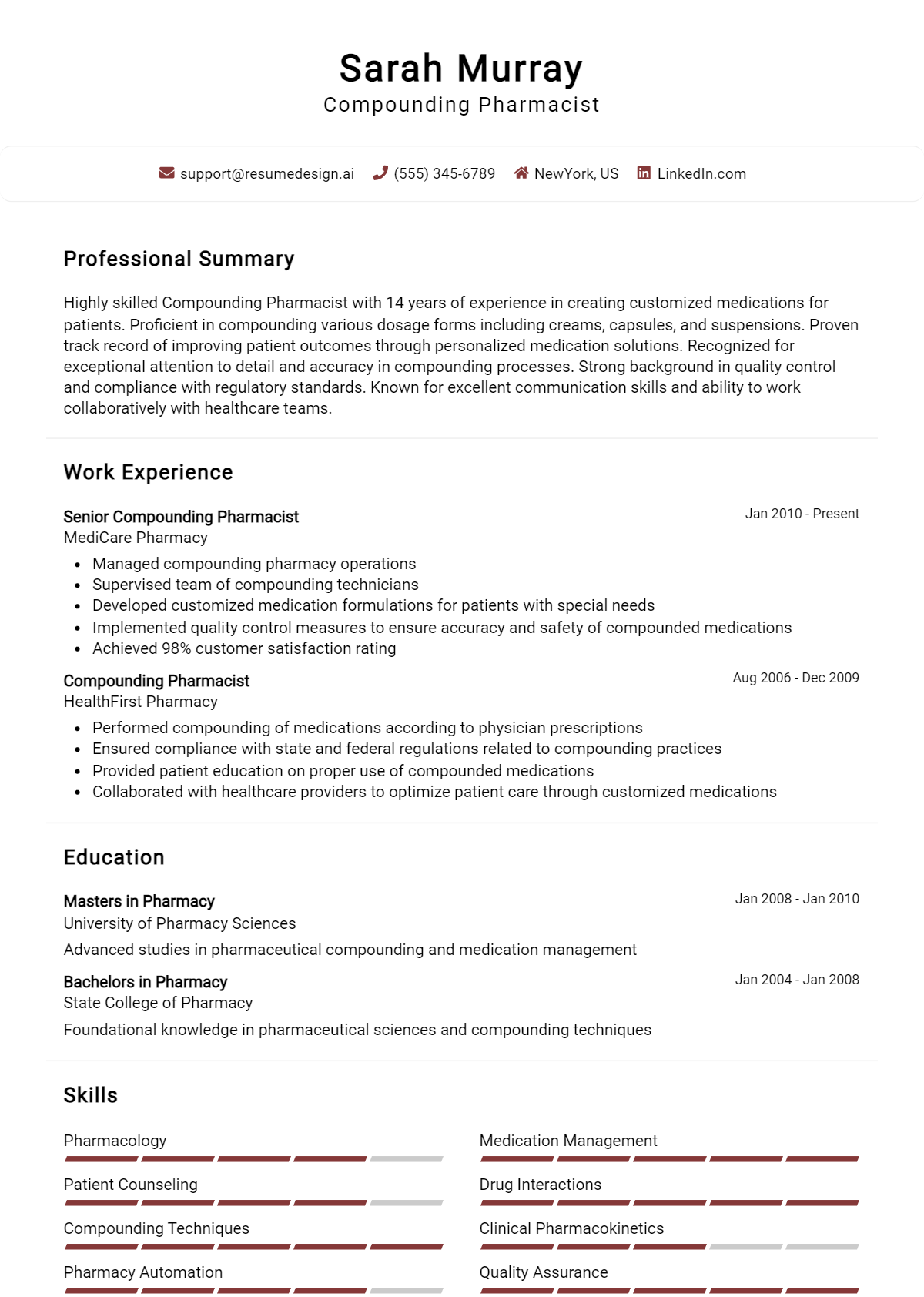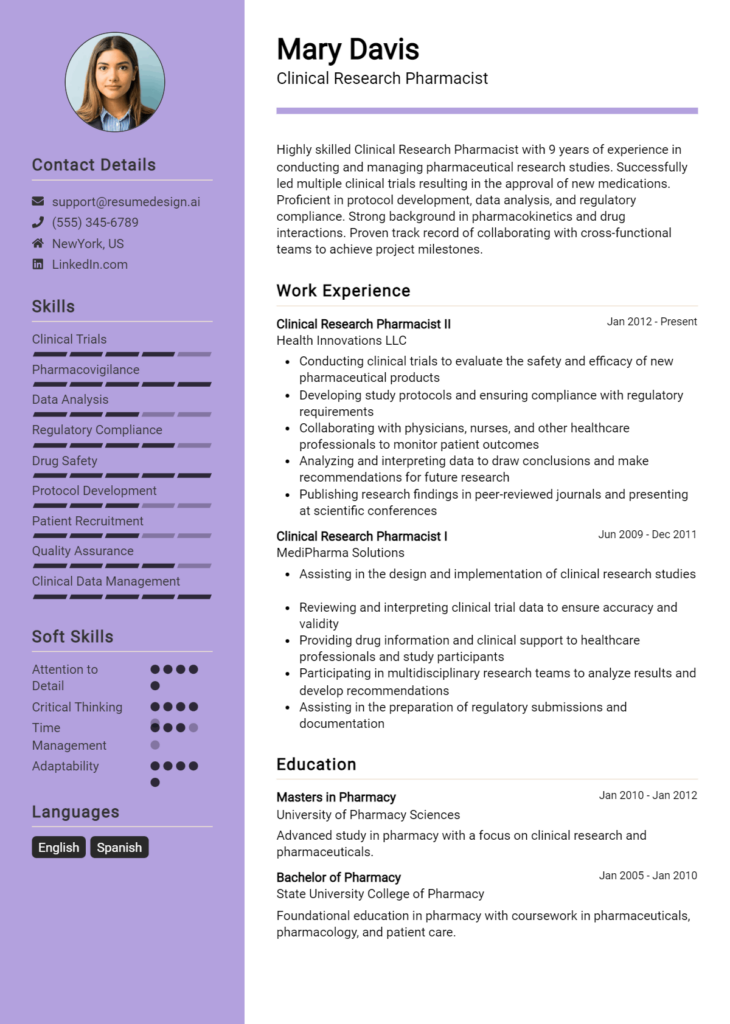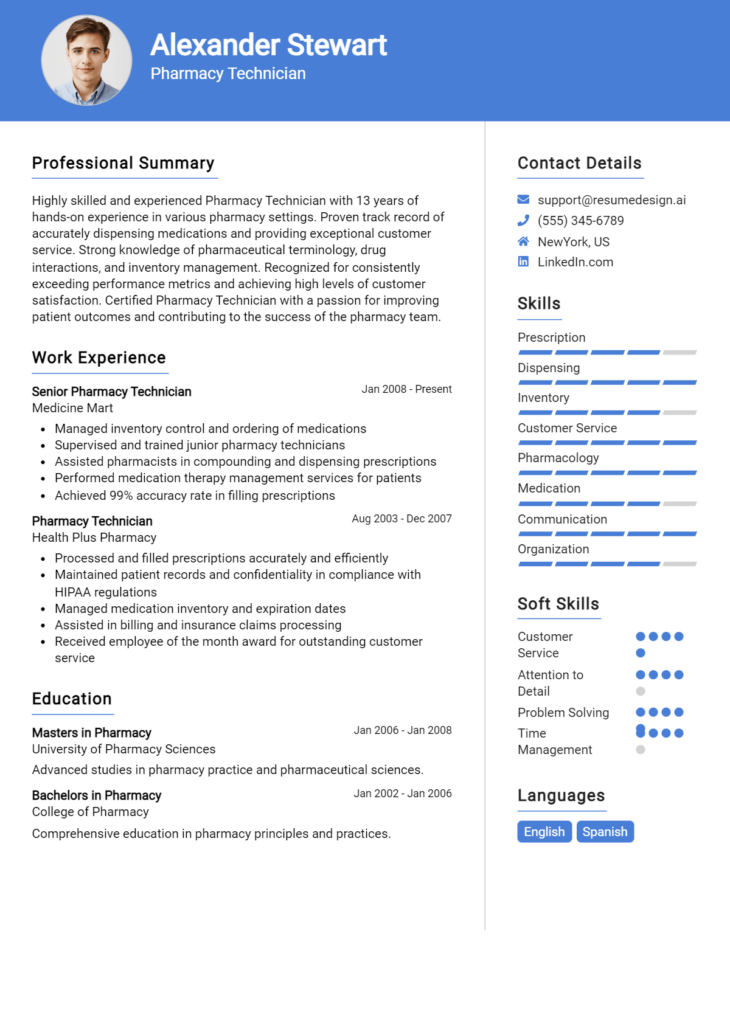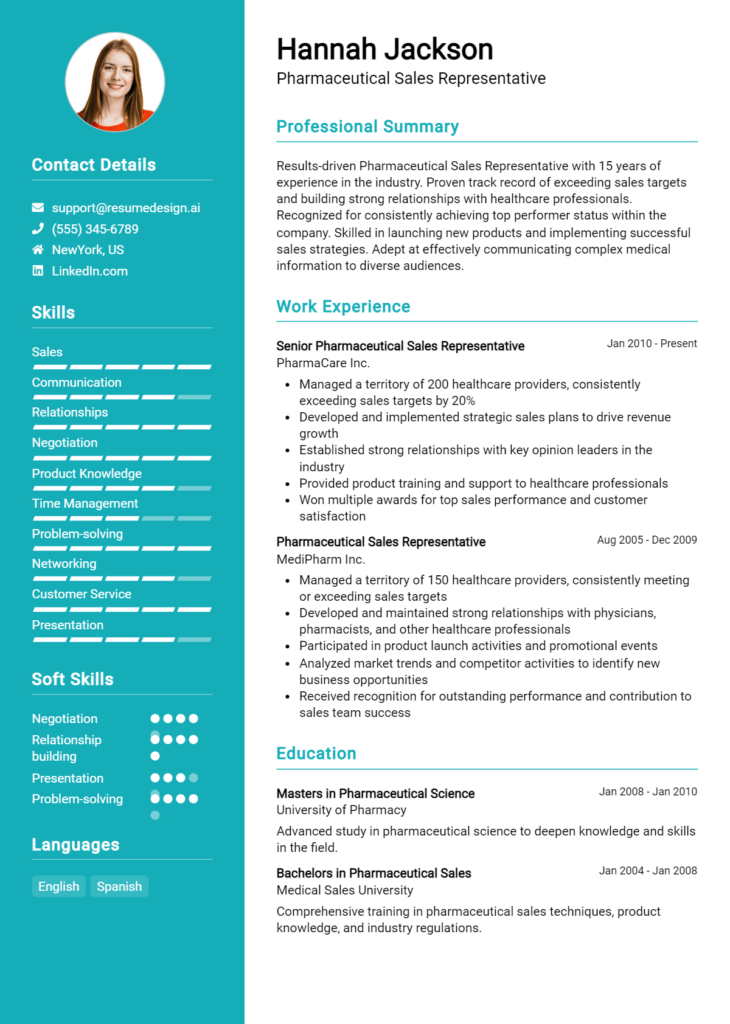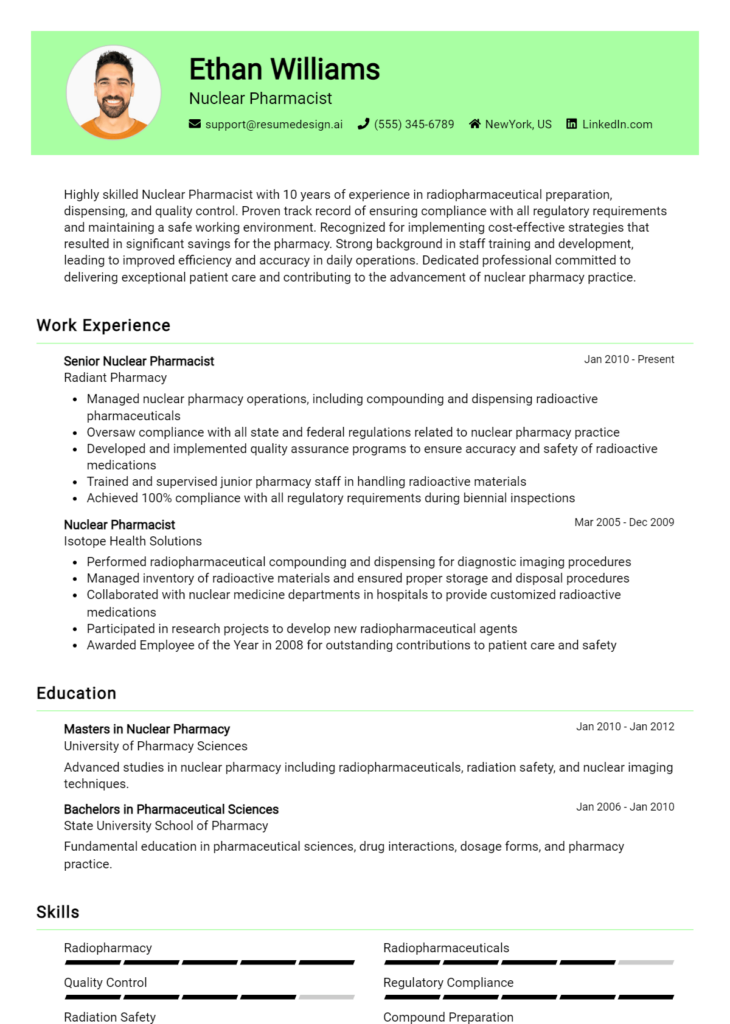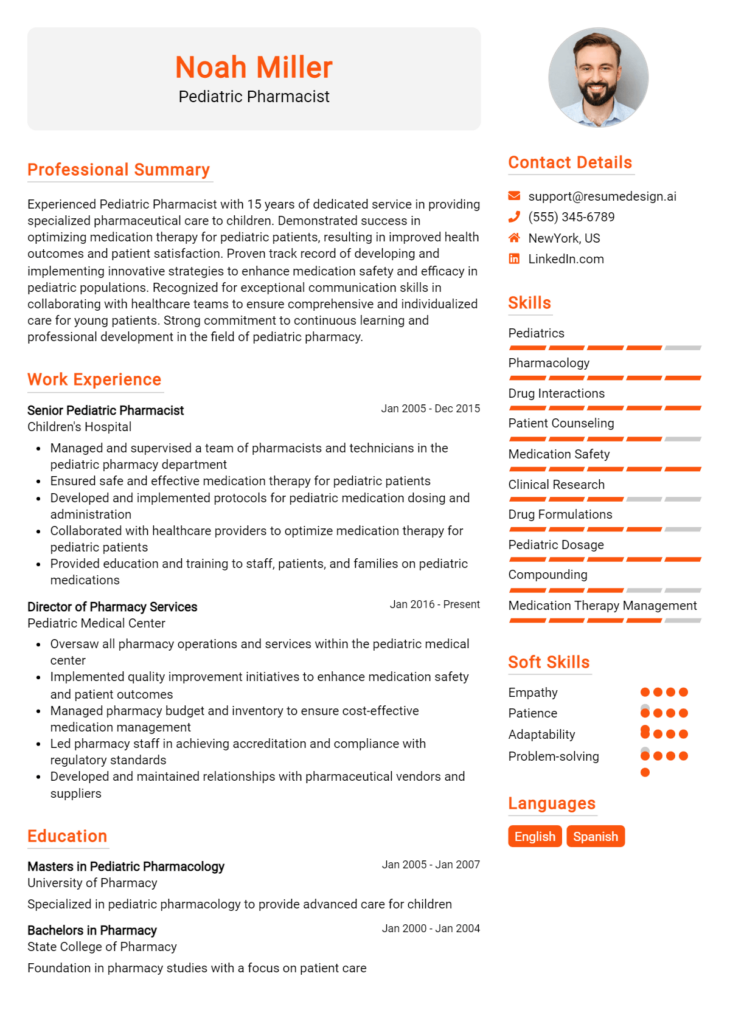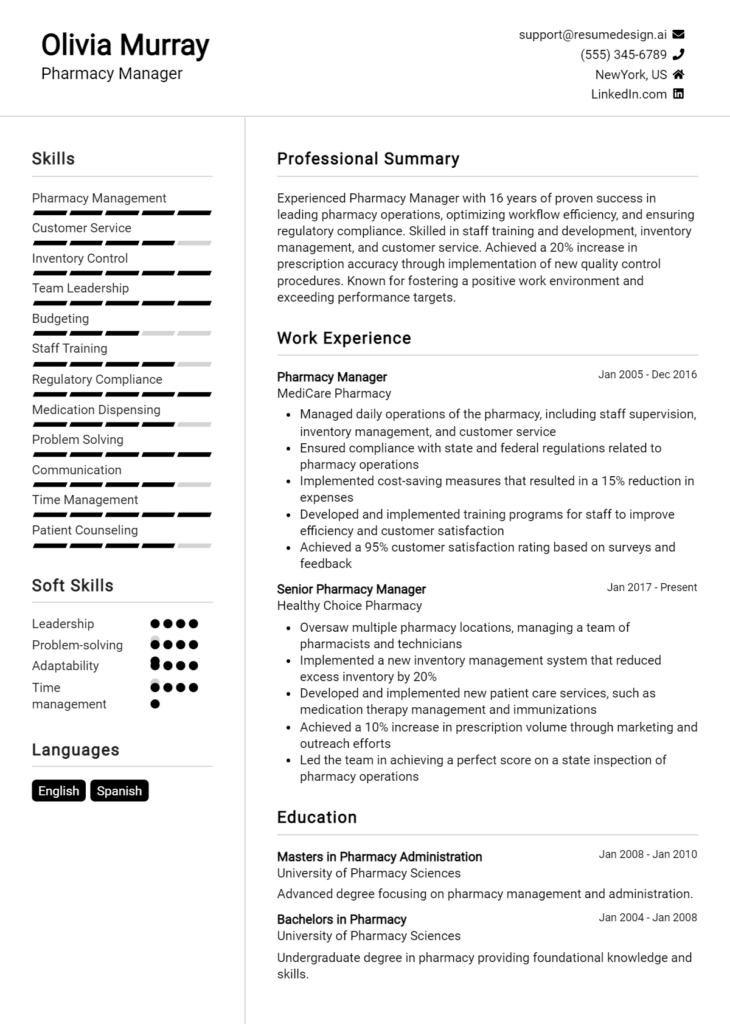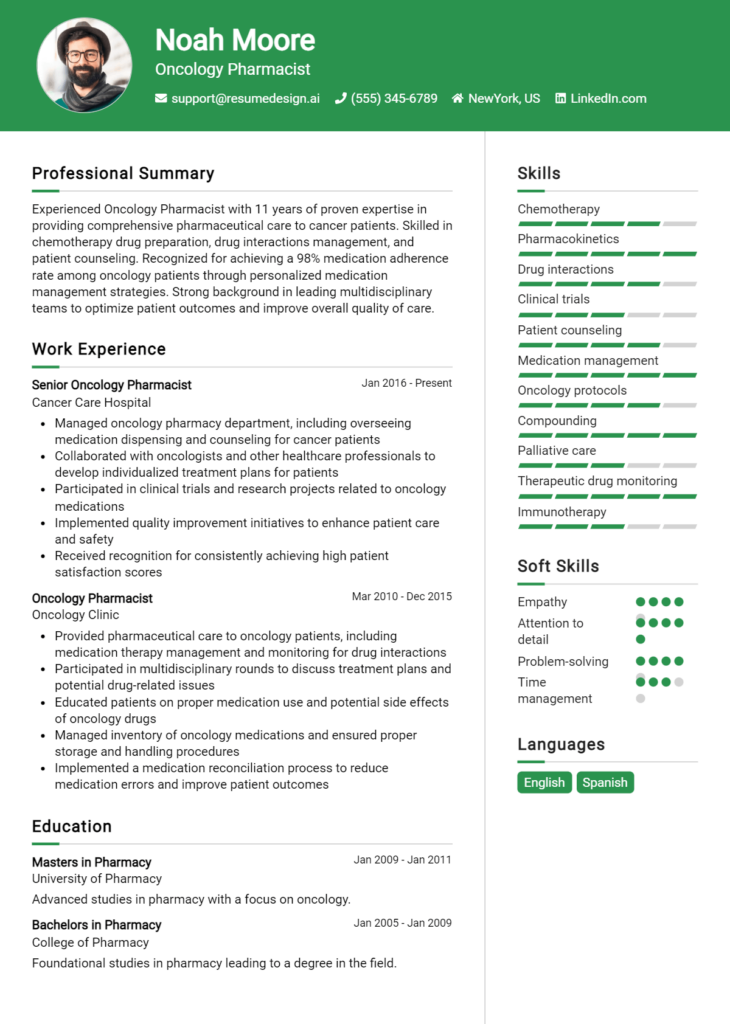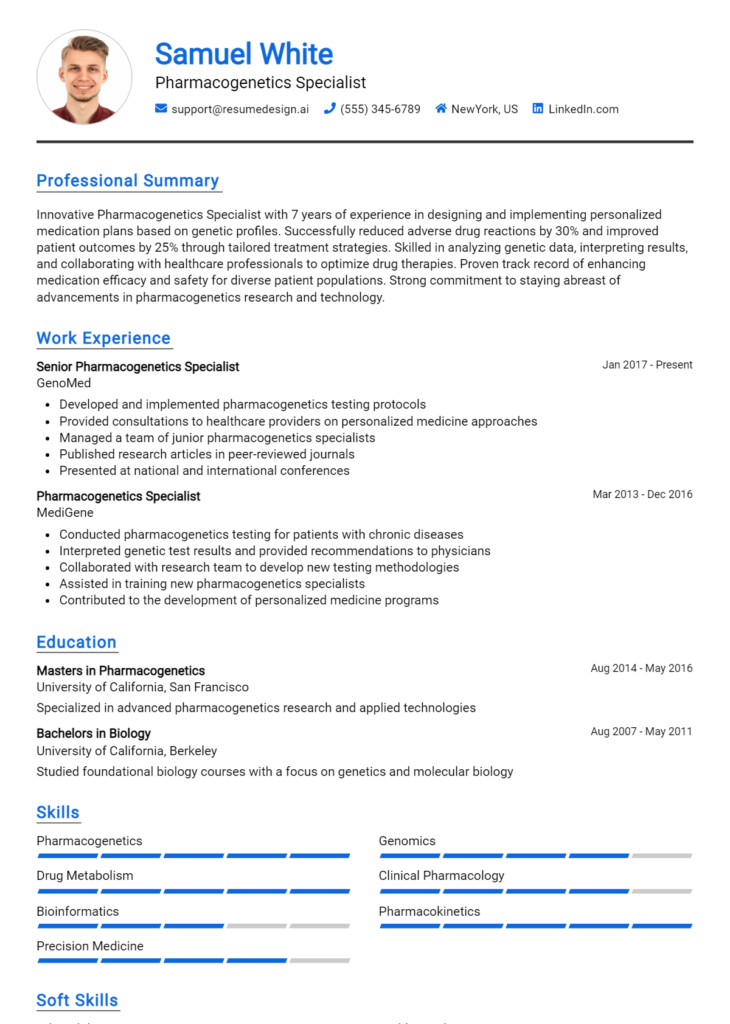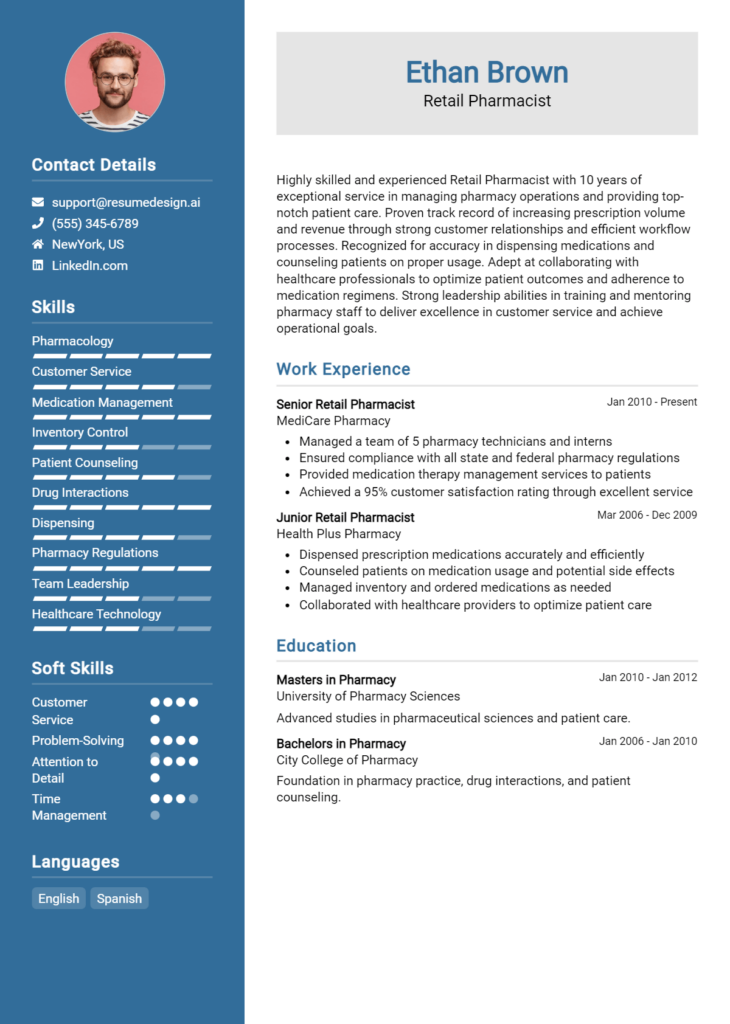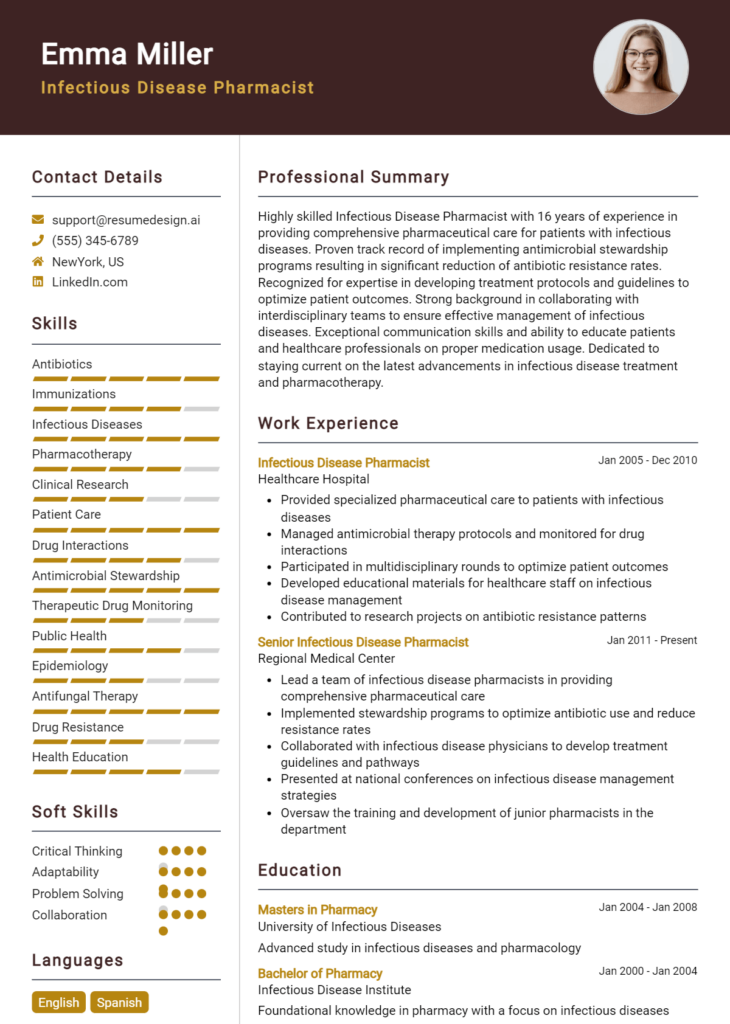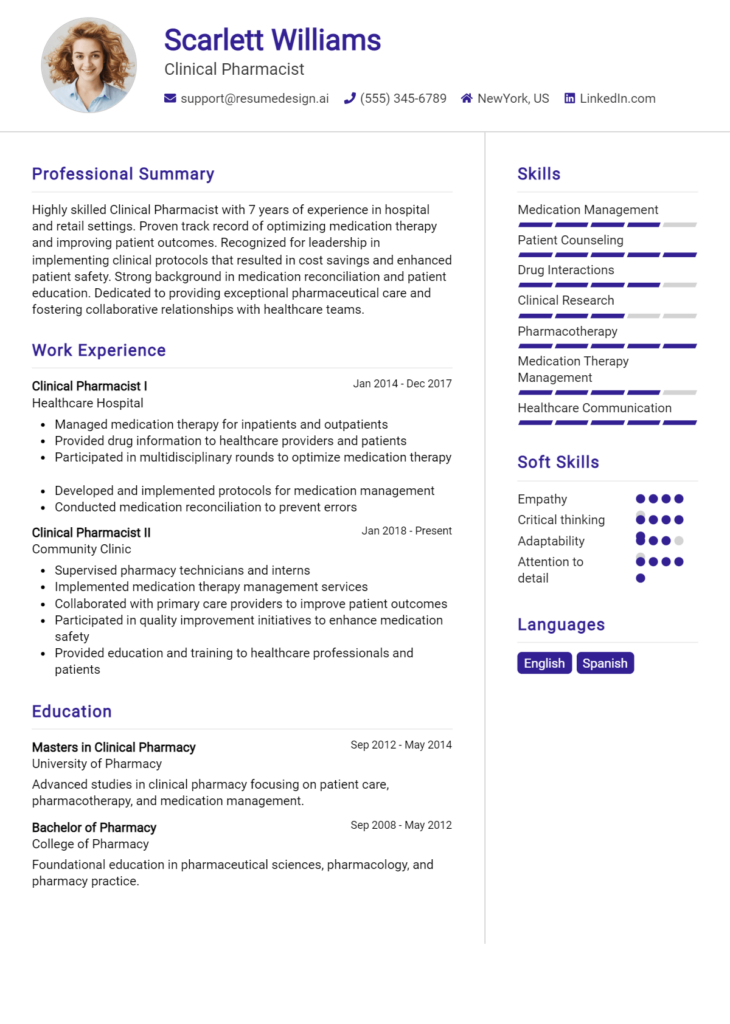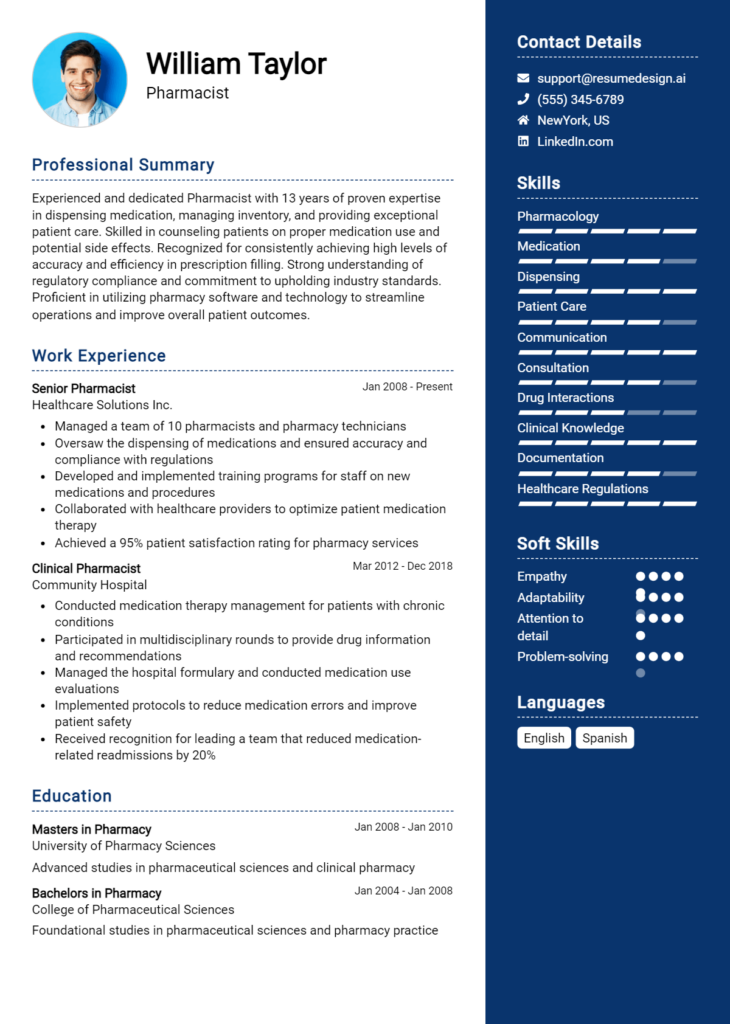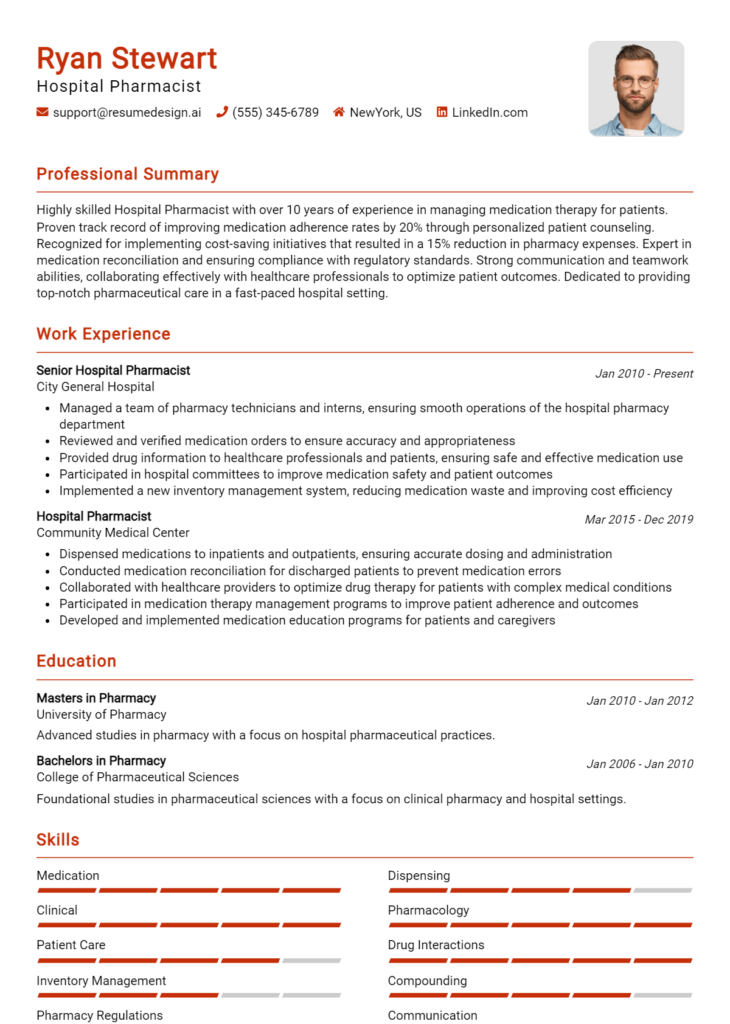Compounding Pharmacist Core Responsibilities
A Compounding Pharmacist plays a crucial role in customizing medications to meet specific patient needs, requiring a blend of technical expertise, operational efficiency, and exceptional problem-solving skills. This professional collaborates closely with healthcare providers, patients, and regulatory bodies to ensure medications are accurately prepared and dispensed. Their contributions are vital to the organization’s goals of patient safety and medication efficacy. A well-structured resume can effectively highlight these qualifications, emphasizing experiences that bridge different functions within healthcare.
Common Responsibilities Listed on Compounding Pharmacist Resume
- Prepare customized medications according to patient-specific prescriptions.
- Ensure compliance with all regulatory standards and guidelines.
- Conduct quality assurance checks on compounded medications.
- Collaborate with healthcare providers to determine patient medication needs.
- Maintain accurate records of compounding activities and formulations.
- Train and supervise pharmacy technicians in compounding procedures.
- Manage inventory of raw materials and compounding supplies.
- Assist in the development of new formulations and compounding techniques.
- Provide patient education on compounded medications and their use.
- Address and resolve any issues related to compounded prescriptions.
- Stay updated on industry trends and advancements in compounding practices.
High-Level Resume Tips for Compounding Pharmacist Professionals
In the competitive field of pharmacy, a well-crafted resume serves as a critical tool for Compounding Pharmacist professionals to showcase their expertise and unique contributions. As the first impression a potential employer receives, your resume must effectively reflect your skills, qualifications, and achievements while demonstrating your ability to excel in a specialized role. This guide will offer practical and actionable resume tips specifically tailored for Compounding Pharmacist professionals, ensuring that your application stands out in a crowded job market.
Top Resume Tips for Compounding Pharmacist Professionals
- Tailor your resume to the job description by using relevant keywords and phrases that match the employer’s needs.
- Highlight your compounding experience prominently, including specific types of compounds you’ve worked with.
- Quantify your achievements wherever possible, such as the volume of prescriptions compounded or improvements in patient outcomes.
- Showcase your certifications and licenses relevant to compounding pharmacy, such as Board Certification in Compounding Pharmacy.
- Include any specialized training or continuing education courses that enhance your compounding skills.
- Emphasize your ability to adhere to regulatory standards and best practices in compounding pharmacy.
- Demonstrate strong communication skills by detailing how you interact with healthcare professionals and patients.
- List any experience with quality assurance processes or risk management in compounding practices.
- Provide examples of how you have contributed to improving pharmacy operations or efficiencies.
- Use a clean, professional format with clear headings and bullet points to enhance readability.
By implementing these tips, Compounding Pharmacist professionals can significantly increase their chances of landing a job in the field. A well-structured and targeted resume not only highlights your qualifications but also conveys your passion and commitment to the profession, making you a compelling candidate for potential employers.
Why Resume Headlines & Titles are Important for Compounding Pharmacist
In the competitive field of pharmacy, particularly in the specialized area of compounding, a well-crafted resume headline or title plays a crucial role in capturing the attention of hiring managers. A strong headline serves as a concise summary of a candidate's key qualifications, instantly communicating their expertise and value proposition. It should be relevant to the specific position being applied for, creating an immediate connection with the employer. By distilling essential information into a powerful phrase, resume headlines not only enhance the overall appeal of the resume but also set the tone for the candidate’s professional narrative.
Best Practices for Crafting Resume Headlines for Compounding Pharmacist
- Keep it concise: Aim for a headline that is no longer than 10-15 words.
- Be specific: Include relevant keywords that align with the job description.
- Highlight key strengths: Focus on your most significant skills or accomplishments.
- Align with the role: Ensure the headline reflects the specific compounding pharmacist position.
- Use action-oriented language: Start with strong verbs to convey your expertise.
- Emphasize unique qualifications: Mention any specialized training or certifications.
- Avoid jargon: Use clear and straightforward language that is easily understood.
- Test different versions: Experiment with various headlines to find the most impactful one.
Example Resume Headlines for Compounding Pharmacist
Strong Resume Headlines
"Experienced Compounding Pharmacist Specializing in Custom Medication Formulations"
“Certified Compounding Pharmacist with 10+ Years in Sterile Compounding Practices”
“Detail-Oriented Compounding Pharmacist Committed to Patient-Centered Care”
Weak Resume Headlines
“Pharmacist Looking for Job”
“Experienced Professional”
Strong headlines are effective because they immediately convey the candidate's relevant skills, experience, and focus within the compounding pharmacy field. They use specific language that aligns with the job description, making it clear to hiring managers exactly what the applicant brings to the table. In contrast, weak headlines tend to be vague and generic, failing to highlight any unique qualifications or specific expertise. This lack of clarity can leave hiring managers unimpressed and less inclined to consider the candidate further.
Writing an Exceptional Compounding Pharmacist Resume Summary
A well-crafted resume summary is essential for a Compounding Pharmacist, as it serves as a powerful introduction to the candidate's qualifications and capabilities. This brief yet impactful section is crucial for capturing the attention of hiring managers, enabling them to quickly assess the applicant's key skills, relevant experience, and notable accomplishments. A strong summary should be concise, tailored to the specific job being applied for, and designed to highlight the candidate's unique value proposition in a competitive job market.
Best Practices for Writing a Compounding Pharmacist Resume Summary
- Start with a strong opening statement that encapsulates your professional identity and years of experience.
- Quantify achievements whenever possible to provide measurable evidence of your impact.
- Focus on relevant skills that align with the job description, emphasizing specific compounding techniques and knowledge.
- Highlight any specialized training or certifications that distinguish you from other candidates.
- Keep the summary concise, ideally within 3-5 sentences, to maintain the hiring manager's attention.
- Use action-oriented language to convey a sense of proactivity and dedication.
- Customize each summary for the specific job application to demonstrate a clear connection between your experience and the employer's needs.
- Showcase your passion for pharmaceutical care and patient safety, reflecting the core values of the profession.
Example Compounding Pharmacist Resume Summaries
Strong Resume Summaries
Detail-oriented Compounding Pharmacist with over 7 years of experience in formulating and dispensing customized medications. Achieved a 30% reduction in prescription errors through meticulous quality control processes and staff training initiatives.
Licensed Compounding Pharmacist with expertise in sterile and non-sterile compounding, successfully increasing patient satisfaction scores by 20% through personalized medication solutions and exceptional customer service.
Results-driven Compounding Pharmacist with a proven track record of developing over 500 unique formulations, improving patient outcomes by collaborating closely with healthcare providers to tailor therapies to individual needs.
Weak Resume Summaries
Experienced pharmacist with knowledge of compounding. Good at working with patients and healthcare professionals.
Compounding Pharmacist with skills in medication preparation and dispensing. Looking for a position to utilize my knowledge in a pharmacy setting.
The strong resume summaries stand out because they provide specific achievements, quantify results, and showcase relevant skills directly related to the Compounding Pharmacist role. In contrast, the weak summaries are vague, lacking concrete examples and measurable outcomes, making it difficult for hiring managers to gauge the applicant's qualifications effectively. A compelling summary not only highlights the candidate's experience but also demonstrates their impact in previous roles, making it an invaluable part of any resume.
Work Experience Section for Compounding Pharmacist Resume
The work experience section of a Compounding Pharmacist resume is critical as it serves as a testament to the candidate's technical skills, leadership capabilities, and commitment to delivering high-quality pharmaceutical products. This section not only highlights relevant past roles but also demonstrates the practical application of knowledge in compounding techniques, regulatory compliance, and team management. By quantifying achievements and aligning experiences with industry standards, candidates can effectively showcase their contributions and potential impact in a pharmacy setting, making them more appealing to prospective employers.
Best Practices for Compounding Pharmacist Work Experience
- Detail specific compounding techniques and technologies used in past roles to showcase technical expertise.
- Quantify achievements, such as the number of prescriptions compounded or error reduction percentages.
- Highlight collaboration with healthcare professionals to demonstrate teamwork and communication skills.
- Include any leadership roles or responsibilities in managing pharmacy staff or training new pharmacists.
- Emphasize adherence to regulatory standards and quality control measures in compounding practices.
- Showcase participation in continuous education or certification programs to reflect commitment to professional growth.
- Describe initiatives taken to improve workflow efficiency or patient safety in the pharmacy.
- Utilize action verbs and clear language to convey accomplishments and responsibilities effectively.
Example Work Experiences for Compounding Pharmacist
Strong Experiences
- Led a team of 5 pharmacists in a compounding lab, resulting in a 30% increase in production efficiency while maintaining a 99% accuracy rate in prescriptions.
- Implemented a new quality assurance protocol that reduced compounding errors by 25% over a 12-month period, enhancing patient safety and satisfaction.
- Collaborated with a multidisciplinary team to develop personalized medication regimens for over 150 patients, improving adherence and therapeutic outcomes.
- Conducted training sessions for pharmacy staff on advanced compounding techniques, resulting in a 40% improvement in team competency scores on internal assessments.
Weak Experiences
- Worked in a pharmacy.
- Responsible for compounding medications.
- Helped team members with various tasks.
- Followed standard procedures as required.
The examples provided are considered strong or weak based on the specificity and quantifiable results they deliver. Strong experiences contain measurable outcomes and detail specific contributions that showcase the candidate's skills and impact in their role. In contrast, weak experiences lack depth and fail to convey significant achievements or responsibilities, making them less compelling to potential employers.
Education and Certifications Section for Compounding Pharmacist Resume
The education and certifications section of a Compounding Pharmacist resume plays a crucial role in establishing the candidate's qualifications and suitability for the position. This section not only showcases the candidate's academic background but also highlights any industry-relevant certifications and ongoing education efforts, which are vital in a field that constantly evolves with new research and regulations. By providing details about relevant coursework, specialized training, and recognized certifications, candidates can significantly enhance their credibility and demonstrate their commitment to professional development, making them more aligned with the expectations of employers in the pharmaceutical field.
Best Practices for Compounding Pharmacist Education and Certifications
- Include relevant degrees such as Doctor of Pharmacy (Pharm.D.) to demonstrate foundational knowledge.
- List industry-recognized certifications like Board Certified Compounding Pharmacist (BCCP) to enhance credibility.
- Provide details of specialized training in sterile and non-sterile compounding to showcase expertise.
- Highlight any continuing education courses related to compounding techniques or pharmaceutical regulations.
- Use clear formatting to ensure easy readability and organization of educational credentials.
- Focus on recent qualifications and certifications to demonstrate current knowledge and skills.
- Tailor the education and certification details to the specific job description for increased relevance.
- Include any memberships in professional organizations related to pharmacy and compounding to reflect engagement in the field.
Example Education and Certifications for Compounding Pharmacist
Strong Examples
- Doctor of Pharmacy (Pharm.D.), University of California, San Francisco, 2020
- Board Certified Compounding Pharmacist (BCCP), Pharmacy Compounding Accreditation Board, 2021
- Advanced Sterile Compounding Techniques, American Pharmacists Association, 2022
- Pharmaceutical Technology: Non-Sterile Compounding, University of Florida, 2021
Weak Examples
- Bachelor of Science in Biology, University of Texas, 2015 (not pharmacy-specific)
- Certified Pharmacy Technician (CPhT), National Pharmacy Technician Certification Board, 2018 (not relevant for compounding)
- High School Diploma, Lincoln High School, 2010 (too basic for a pharmacist role)
- Certification in Retail Pharmacy Management, 2016 (not focused on compounding)
The strong examples are considered effective because they directly relate to the skills and knowledge required for a Compounding Pharmacist role, showcasing advanced degrees and certifications that emphasize specialized training in compounding. In contrast, the weak examples fail to demonstrate relevance to the specific responsibilities of a Compounding Pharmacist. They either reflect outdated qualifications or do not align with the compounding focus, thus diminishing the candidate's overall appeal in a competitive job market.
Top Skills & Keywords for Compounding Pharmacist Resume
The role of a Compounding Pharmacist is crucial in the healthcare system, as they prepare customized medications tailored to the unique needs of patients. A well-crafted resume highlighting the right skills can significantly enhance a candidate’s chances of standing out in this specialized field. Hiring managers often look for a blend of both hard and soft skills that demonstrate a pharmacist's technical proficiency and their ability to communicate effectively with patients and healthcare professionals. Including relevant skills in your resume will not only show your qualifications but also your commitment to providing exceptional pharmaceutical care.
Top Hard & Soft Skills for Compounding Pharmacist
Soft Skills
- Attention to Detail
- Communication Skills
- Problem-Solving Abilities
- Empathy and Patient Care
- Time Management
- Team Collaboration
- Adaptability
- Critical Thinking
- Customer Service Orientation
- Ethical Judgment
Hard Skills
- Knowledge of Pharmaceutical Compounding Techniques
- Proficiency in Laboratory Equipment
- Understanding of USP Guidelines
- Medication Safety Practices
- Formulation Development
- Quality Control Procedures
- Record Keeping and Documentation
- Knowledge of Drug Interactions
- Familiarity with Regulatory Compliance
- Compounding Software Proficiency
By combining these essential skills with relevant work experience in your resume, you can effectively showcase your qualifications for the role of a Compounding Pharmacist and increase your chances of securing an interview.
Stand Out with a Winning Compounding Pharmacist Cover Letter
Dear [Hiring Manager's Name],
I am writing to express my interest in the Compounding Pharmacist position at [Company Name], as advertised on [Job Board/Company Website]. With a Doctor of Pharmacy degree and over [X years] of experience in compounding specialty medications, I am confident in my ability to contribute effectively to your team and provide exceptional patient care. My dedication to precision in pharmaceutical preparation, along with my strong understanding of regulatory compliance and quality assurance, makes me a strong candidate for this role.
Throughout my career, I have developed a deep proficiency in formulating customized medications tailored to meet the specific needs of patients. At [Previous Employer], I successfully compounded a wide range of formulations, including sterile and non-sterile preparations, ensuring strict adherence to USP guidelines. My attention to detail and commitment to maintaining the highest standards of safety and efficacy have consistently resulted in positive patient outcomes. I also have experience collaborating with healthcare providers to assess patient needs and adjust formulations as required, fostering a team-oriented approach to pharmaceutical care.
In addition to my technical skills, I possess excellent communication and interpersonal abilities, which I believe are essential for building rapport with patients and their families. I am passionate about educating patients on their medications and the importance of adherence to prescribed therapies. I have actively participated in patient counseling sessions, helping to demystify complex medical information and empower patients to take charge of their health. I am excited about the opportunity to bring my expertise and compassionate approach to [Company Name] and contribute to your mission of enhancing patient well-being.
Thank you for considering my application. I look forward to the possibility of discussing how my background, skills, and enthusiasm for compounding pharmacy align with the goals of your team. Please feel free to contact me at [Your Phone Number] or [Your Email Address] to arrange a conversation.
Sincerely,
[Your Name]
[Your LinkedIn Profile or Professional Website] (if applicable)
Common Mistakes to Avoid in a Compounding Pharmacist Resume
When crafting a resume as a Compounding Pharmacist, it's crucial to present your skills and experiences effectively to stand out in a competitive job market. However, many candidates make common mistakes that can undermine their qualifications and professionalism. To enhance your chances of landing an interview, be aware of these pitfalls and take steps to avoid them.
Lack of Specificity: Failing to include specific details about your compounding experiences can make your resume vague. Use quantifiable achievements and specific examples of formulations you've prepared.
Ignoring Regulatory Knowledge: Not highlighting your understanding of pharmacy regulations and standards can be detrimental. Compounding pharmacists must comply with strict guidelines, so mentioning relevant certifications or training is essential.
Overlooking Technical Skills: Compounding pharmacists use various techniques and equipment. Neglecting to list technical skills related to compounding processes can weaken your resume.
Inconsistent Formatting: Using different fonts, sizes, or styles throughout your resume can make it look unprofessional. Maintain a consistent format to enhance readability.
Vague Job Descriptions: Providing generic job descriptions instead of detailed tasks can diminish the impact of your experience. Clearly outline your responsibilities and contributions in previous roles.
Lack of Continuing Education: Not mentioning ongoing education or training can imply stagnation in your professional development. Highlight any recent courses or certifications to show your commitment to staying current in the field.
Not Tailoring the Resume: Sending out a one-size-fits-all resume can be a mistake. Tailor your resume for each job application, emphasizing the skills and experiences that align with the specific position requirements.
Neglecting Soft Skills: Compounding pharmacists often work as part of a healthcare team. Failing to showcase soft skills like communication, teamwork, and problem-solving can make your resume less attractive to potential employers.
Conclusion
As a compounding pharmacist, you play a vital role in healthcare by creating personalized medications tailored to meet the unique needs of patients. Your expertise in chemistry, pharmacology, and patient care is essential for ensuring the safety and effectiveness of the medications you prepare. Throughout this article, we highlighted the importance of understanding compounding laws and regulations, maintaining a sterile environment, and collaborating with healthcare professionals to optimize patient outcomes.
In addition, we discussed the necessity for continuous education to stay updated on new compounding techniques and advancements in pharmaceutical science. Your resume should reflect not only your technical skills but also your commitment to patient care and regulatory compliance.
Now is the perfect time to review and enhance your Compounding Pharmacist resume to ensure it stands out to potential employers. Utilize resources such as resume templates, a user-friendly resume builder, informative resume examples, and tailored cover letter templates to create a compelling application. Take the next step in your career by updating your resume today!

